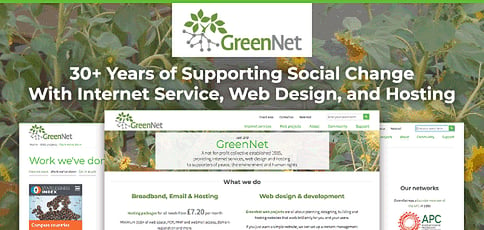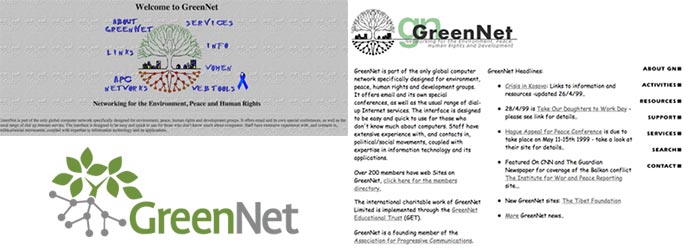
TL; DR: Since before the World Wide Web, GreenNet has pursued its mission of providing an effective and affordable way for activists and nonprofit organizations to communicate. The collective connects those behind movements for peace, human rights, social justice, and environmental sustainability with internet services, web design, development, and hosting. GreenNet strikes a balance of ensuring an organization’s message is seen and heard while protecting whistleblowers and activists facing persecution. A charter organization of the Association for Progressive Communications and a member of the UK Internet Service Providers Association, GreenNet relies on open-source technologies and advocates for a free and globally accessible internet.
You don’t have to talk with staff members for long before getting a sense that GreenNet is not a typical web hosting provider. As roles within the collective are traditionally flexible, Edward Maw jokingly checked with colleagues around the room what his official job title was.
“We just carry out the work that needs doing,” the Web Projects Manager said. “We’re all on the same level and have a flat structure. We like operating in that way, as a very egalitarian organization. That goes alongside our approach to technology.”
GreenNet counts on open-source software and recycled hardware whenever possible to deliver internet services, web design and development, and hosting to support the people and organizations seeking social change. With roots dating back to 1985, the not-for-profit collective has campaigned for equal and open online communications even before the World Wide Web’s existence.
GreenNet now operates from fresh new headquarters in London, called “The Green House,” and, unsurprisingly, the office and datacenter are powered with energy from renewable resources. In fact, the company’s datacenter is ISO5001 certified, and the team boasts a number of credentials that speak to its commitment to delivering environmentally sound hosting. From individual activists to major non-governmental organizations, GreenNet customers advocate for movements in human rights, economic justice, environmental sustainability, and world peace.
“Some of our customers are operating in environments where they’re under a lot of pressure, either financial or political,” Edward said. “Sometimes the stories they want to tell can be quite challenging, or sometimes the budget they have to spend on their website or hosting is pretty small. We like to try and help out as many different organizations and causes as we can.”
Three Decades of Ethical Web Services and Online Communications
Back when GreenNet got started, the internet was a much different place. A graphical web browser wouldn’t be invented for another seven years, and access to the internet was limited largely to governments, science laboratories, and universities. Networks were localized to specific locations, regions, and countries — GreenNet even predates international, non-military internet connections.

GreenNet launched its first website (top left) in the early 90s before redesigning it a few years later (right).
“If you think back to how the internet was back then, it was a very different situation from what it is now,” Edward said. “It certainly wasn’t the popular tool it is now.”
In London, a handful of environmentally minded tech enthusiasts collaborated to devise systems to support the networking goals and needs of the sustainability movement. GreenNet started as a bulletin board system in 1985 and opened London’s first internet cafe two years later. The same year, GreenNet and similar American organizations, PeaceNet and EcoNet, set up the first transatlantic connection.
Within a few years, the organizations joined other nonprofit networks from Sweden, Canada, Brazil, Nicaragua, and Australia as charter members of the Association for Progressive Communications. In fact, GreenNet Co-Founders Mitra Ardron and Mark Graham met up with Peter Gabriel and Steven van Zandt of Musicians for Peace and helped choose the APC’s name in 1987. APC furthers the mission to support and empower advocacy groups pushing for social justice and environmental sustainability and currently has 58 member networks across 74 countries.
GreenNet worked to bring international internet gateways to more than 50 underserved areas in Asia and Africa, along with Central and Eastern Europe. In some cases, the email exchange provided the only means of electronic communication between those countries and the rest of the world.
“GreenNet was one of the first networks to provide connectivity in some parts of the world, but the aim of that really was for us to support charities, NGOs, activists, and campaigners,” Edward said. “It was very much seen as a movement alongside some of the other big networks that were coalescing at the time, many of which were run by the military or by corporations and so on.”
GreenNet’s Hands-On Approach to Working With Customers
Serving everyone from individual activists to international organizations, GreenNet needs to adapt to a wide range of user requirements. The GreenNet portfolio currently focuses on web hosting and email services, but the company also offers website design and development, domain registrations, and broadband capabilities. Hosting ranges from shared hosting to VPS, colocation services, and cloud storage.
“We will try and work with people on any sort of scale to be able to provide the right sort of services for them, according to their budget, ambitions, and so on,” Edward said.

GreenNet developers will help activists and organizations design, plan, build, and test websites to spread their message.
Among those looking to change the world, however, are people who wish to remain anonymous out of fear of retribution. GreenNet will protect customers’ identities and help them find and use secure processes, Edward said, mentioning human rights defenders or whistleblowers wanting to expose a large corporation’s misdeeds as examples.
“Our Web Projects team helps them not only work on their website but also with tools to help them communicate behind the scenes,” he said. “Liz, Claire, Ian, Marek, and I help them to develop skills with things like encryption so they can carry out their work safely.”
As a comparatively small organization, Edward said that GreenNet employees are quite familiar with each customer.
“Andrew, Ian, and Cedric staff our support line, and Howard handles our finances,” he said.
Many customers stick with the service-oriented network for several years, which helps mold support and onboarding processes to be the most effective.
“The way we most often seem to help is when people come to us with quite uninformed ideas about what they want to achieve,” Edward said. “We’ve got lots of experience, so we can really help people get themselves set up online even if they start out not really knowing what they need in technical terms.”
Advocating for Open-Source Technology and a Freely Accessible Internet
Parallel to GreenNet’s mission to empower social change online are the efforts to make the access to internet connections and software technologies a global standard. Internally, the organization uses almost exclusively open-source programs, according to Edward, as well as recycled hardware whenever possible.
“Sometimes we’re even in the position to recommend open, free, or sustainable options and help our customers escape the corporate and commercial sources of technology,” he said.

In addition to using open-source software and recycled hardware, GreenNet’s offices were built with sustainable practices.
GreenNet originally used the ActionApps web publishing tool, an open-source platform geared for nonprofits, before moving to Drupal in 2006 and increasingly into work with WordPress. The team has helped train nonprofit networks all over the world, recently including Belgium Spain and Mexico in Linux, Drupal, and other open source tools.
“When we work with other like-minded organizations, we’re part of an informal movement to look at the infrastructure of the internet, both the hardware and the software, and campaign to keep it free and accessible,” Edward said.
GreenNet still supports the original approach and mission of the internet, where you could do pretty much everything without cost or oversight — unlike the free services of companies like Google and Facebook that are funded by advertising or selling consumer data, he said.
“We would like the internet to be accessible to everyone,” he continued. “Surrendering your personal information shouldn’t be something you have to do to have access to the internet.”
HostingAdvice.com is a free online resource that offers valuable content and comparison services to users. To keep this resource 100% free, we receive compensation from many of the offers listed on the site. Along with key review factors, this compensation may impact how and where products appear across the site (including, for example, the order in which they appear). HostingAdvice.com does not include the entire universe of available offers. Editorial opinions expressed on the site are strictly our own and are not provided, endorsed, or approved by advertisers.
Our site is committed to publishing independent, accurate content guided by strict editorial guidelines. Before articles and reviews are published on our site, they undergo a thorough review process performed by a team of independent editors and subject-matter experts to ensure the content’s accuracy, timeliness, and impartiality. Our editorial team is separate and independent of our site’s advertisers, and the opinions they express on our site are their own. To read more about our team members and their editorial backgrounds, please visit our site’s About page.

